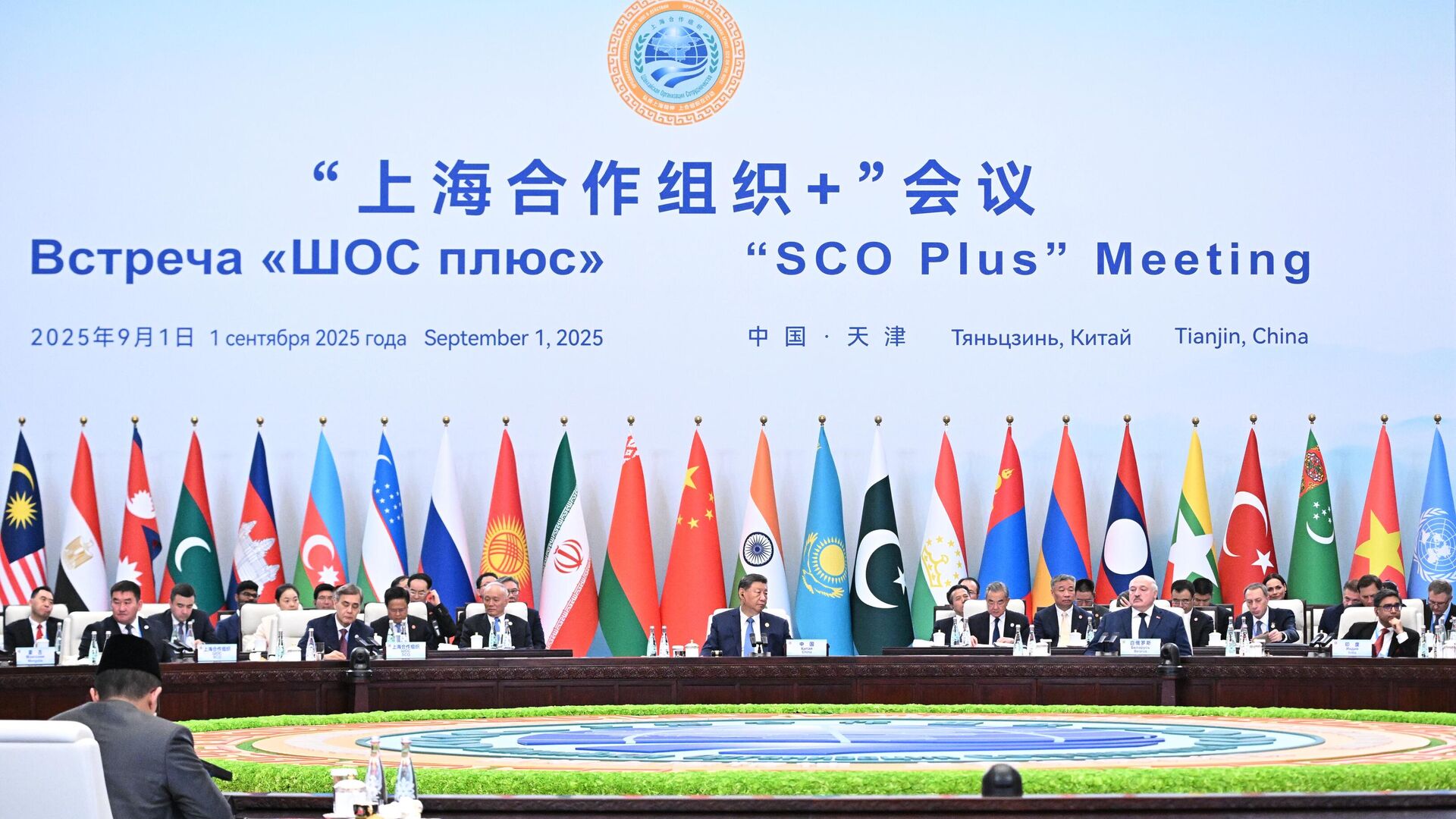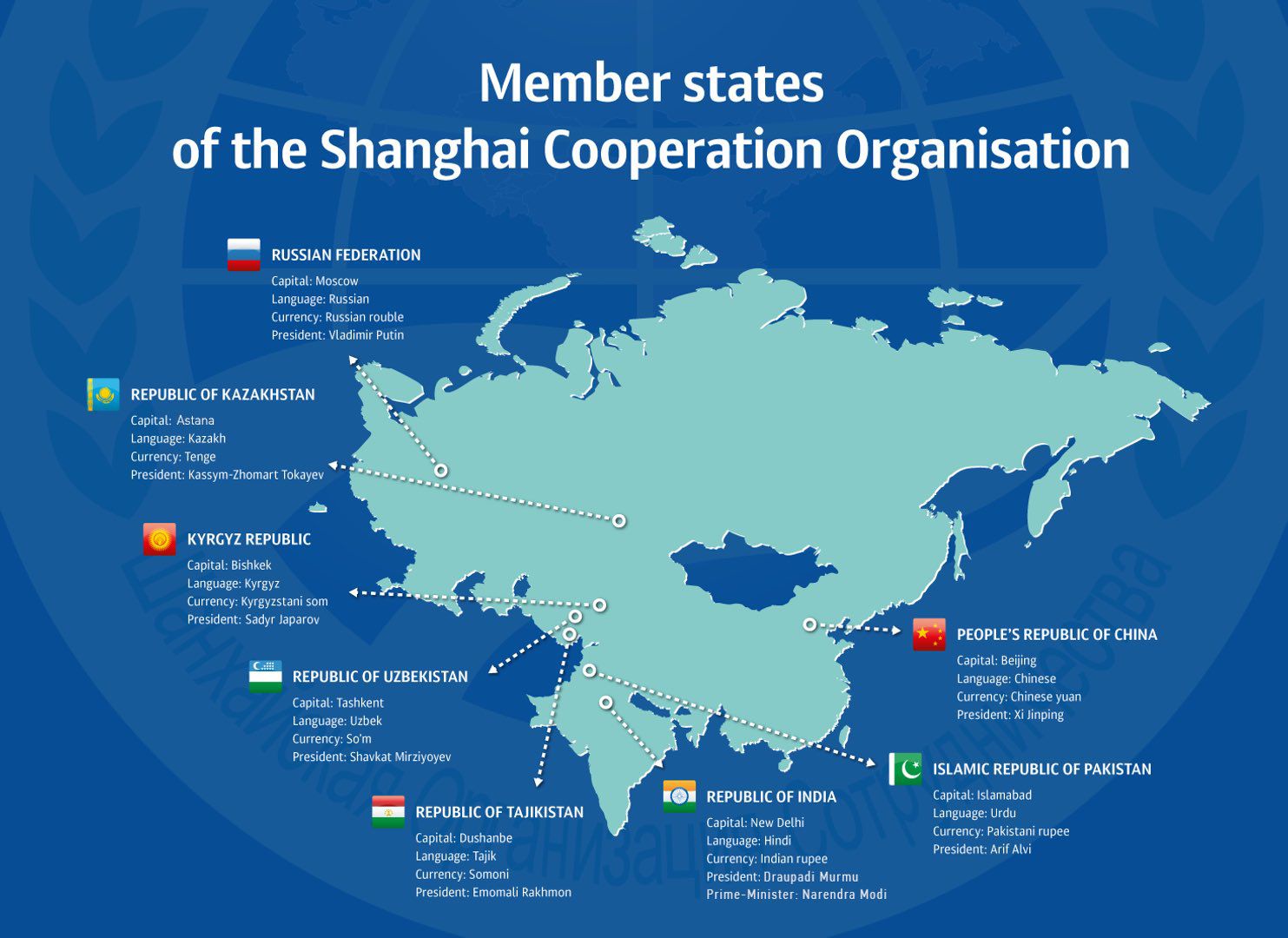



The Tianjin Declaration from the 25th SCO Summit promotes a multipolar world, emphasizing counter-terrorism, global governance reform, and economic integration. The SCO's effectiveness is challenged by China's dominance and internal rivalries. For India, it is a platform to pursue strategic autonomy and navigate complex regional power dynamics while addressing terrorism.

Copyright infringement not intended
Picture Courtesy: ECONOMIC TIMES
The 25th Shanghai Cooperation Organisation (SCO) Summit, held in Tianjin, China, from August 31 to September 1, 2025, adopted the Tianjin Declaration.
Counter-Terrorism and Security
Condemnation of Terrorism: Condemned Pahalgam attack, rejecting double standards in counter-terrorism efforts and emphasizing the need to halt cross-border terrorist movements.
Universal Center for Countering Threats: An agreement was adopted to establish a Universal Center for Countering Challenges and Threats to enhance security cooperation among member states.
Regional Anti-Terrorist Structure (RATS): Reaffirmed RATS’s role in coordinating efforts against terrorism, extremism, and drug trafficking.
Global Governance Reform
Call for Reform: Advocated for reforms in the United Nations Security Council (UNSC) to ensure greater representation for developing countries, aligning with India’s long-standing demand for a permanent UNSC seat.
Opposition to Unilateral Sanctions: Member states opposed unilateral coercive measures, such as economic sanctions, that violate UN and World Trade Organization (WTO) principles.
Global Governance Initiative (GGI): Proposed by China, the GGI promotes multilateralism and a just global order, resonating with India’s vision of “One Earth, One Family, One Future”.
Economic and Development Cooperation
SCO Development Bank: Creation of an SCO Development Bank to finance regional projects, with China pledging $1.4 billion in loans to support infrastructure and trade.
Trade and Connectivity: Stabilizing global trade and enhancing connectivity through projects like the International North-South Transport Corridor (INSTC) and Chabahar Port.
Energy Cooperation: SCO Energy Club was highlighted, with member states’ renewable energy capacity reaching 2.31 billion kW in 2024, accounting for nearly half of the global total.
Technological and Digital Cooperation
Artificial Intelligence (AI): Stressed equal rights for all countries to develop and use AI, pledging cooperation to reduce risks and promote open-source AI models.
Digital Economy: Initiatives like the SCO Digital Economy Forum and Digital Silk Road were prioritized to enhance cross-border e-commerce, which grew by 34% in 2024.
BeiDou Satellite Access: China offered access to its BeiDou Navigation Satellite System to enhance regional connectivity and space cooperation.
Cultural and Social Values
People-to-People Ties: Emphasized mutual respect, cultural diversity, and initiatives like the SCO National Television Festival to foster humanitarian exchanges.
UNGA Resolution: Welcomed a UN General Assembly resolution against the glorification of Nazism, neo-Nazism, racism, and xenophobia.
Regional Focus: Condemned military actions in Gaza and Iran and called for inclusive governance in Afghanistan for lasting peace.
The SCO’s journey began with the Shanghai Five in 1996, formed by China, Russia, Kazakhstan, Kyrgyzstan, and Tajikistan to resolve border disputes post-Cold War.
In 2001, Uzbekistan joined, transforming the group into the SCO, with a broader focus on security, economic cooperation, and regional stability.
2004: Establishment of the Regional Anti-Terrorist Structure (RATS) in Tashkent to combat terrorism, separatism, and extremism.
2017: Expansion to include India and Pakistan as full members, significantly increasing the SCO’s geopolitical weight.
2023-2024: Inclusion of Iran (2023) and Belarus (2024), expanding the SCO to 10 members, covering 24% of global landmass and 42% of the world’s population.
Astana Summit 2024: Laid the groundwork for environmental cooperation, digital currency proposals, and Belarus’s membership formalization.
 Challenges in the SCO
Challenges in the SCO
Weak Counter-Terrorism Mechanisms: The RATS lacks the capacity to target specific terrorist organizations effectively. The inclusion of Pakistan, weakens the SCO’s credibility.
China’s Dominance: China’s push to align the SCO with its Belt and Road Initiative (BRI), particularly the China-Pakistan Economic Corridor (CPEC) through Pakistan-occupied Kashmir, conflicts with India’s sovereignty concerns.
Ineffective Economic Integration: Intraregional trade in Central Asia remains low (single digits), far behind ASEAN’s 25%. SCO agreements, such as the Transport Agreement, suffer from poor implementation.
Geopolitical Rivalries: SCO’s perceived anti-Western stance, driven by China, Russia, and Iran, complicates India’s strategic partnerships with the US, EU, and Quad.
Institutional Weaknesses: SCO lacks robust frameworks for energy, trade, and development cooperation, with bodies like the SCO Business Council functioning more as networking forums than decision-making entities.
China’s Regional Ambitions: India opposes the BRI due to CPEC’s violation of its territorial integrity. China’s String of Pearls strategy (naval bases in Maldives, Sri Lanka, and the South China Sea) threatens India’s security, countered by India’s Necklace of Diamonds strategy (e.g., Chabahar Port, Quad).
Terrorism and Pakistan: Pakistan’s support for terrorism, including groups like Lashkar-e-Taiba, undermines the SCO’s counter-terrorism agenda. India’s efforts to list Pakistan-based groups are blocked by China and Pakistan.
Balancing Global Alliances: SCO’s anti-Western perception complicates India’s ties with the US, particularly amid US tariffs on Indian oil imports from Russia (50% in 2025). India’s engagement with the SCO and Quad reflects its pursuit of strategic autonomy.
Water Security: India raised concerns over China’s Medog Hydropower Station on the Yarlung Tsangpo River, highlighting potential downstream impacts on water security and ecological stability.
Strengthen Counter-Terrorism Mechanisms: Enhance RATS’s operational capacity to target specific terrorist groups and enforce accountability, addressing India’s concerns over Pakistan’s role.
Balance China’s Influence: India should deepen ties with Russia and Central Asian states to counter China’s dominance, reviving the Russia-India-China (RIC) trilateral for multilateral engagement. Promote alternative connectivity projects like INSTC and Chabahar Port.
Institutional Reforms: Fast-track the SCO Development Bank and develop binding frameworks for energy, trade, and digital cooperation, drawing inspiration from ASEAN’s integrated approach.
Strategic Multialignment: India should continue selective engagement, prioritizing non-sensitive areas like renewables, AI, and digital inclusion while safeguarding sovereignty concerns.
Bilateral Dialogue with China: Sustain momentum from the Modi-Xi meeting (Tianjin, 2025) to resolve LAC disputes through disengagement agreements (e.g., Depsang and Demchok, 2024) and enhance trade transparency.
The Tianjin Declaration 2025 positions the SCO as a key player in promoting a multipolar world, emphasizing security, economic integration, and global governance reform. However, challenges like China’s dominance, weak institutional frameworks, and internal rivalries limit its potential. For India, the SCO offers a platform to advance its strategic autonomy, promote sustainable development, and counter terrorism, but it must navigate China’s influence and Pakistan’s role carefully.
Source: ECONOMIC TIMES
|
PRACTICE QUESTION Q. India’s membership in the Shanghai Cooperation Organisation (SCO) is a delicate balancing act. Critically analyze. 250 words |
India was granted full membership in 2017 at the Astana Summit, along with Pakistan.
It was the precursor to the SCO, formed in 1996, consisting of China, Russia, Kazakhstan, Kyrgyzstan, and Tajikistan.
SCO Summit 2025 adopted the Tianjin Declaration, which focused on enhanced security cooperation, economic integration, and a call for a more multipolar world.




© 2026 iasgyan. All right reserved